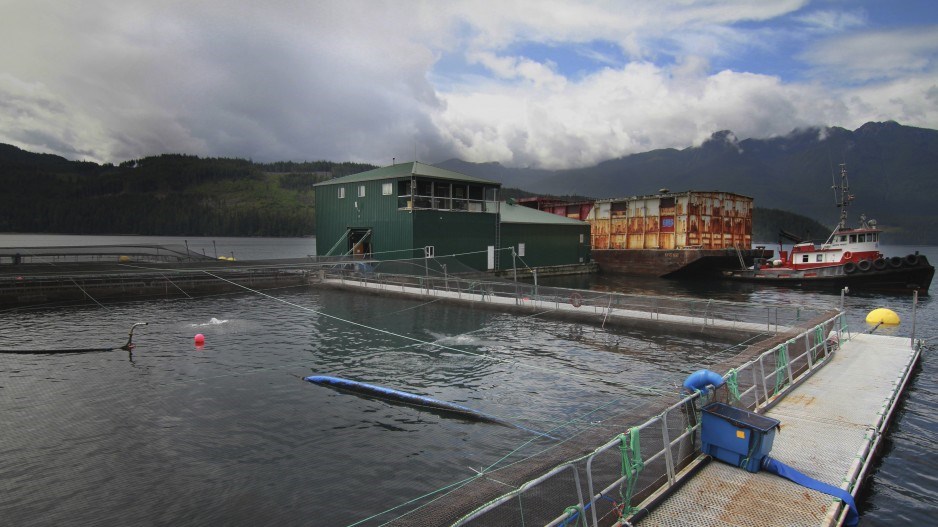An industry that supports 6,000 jobs in B.C., mostly in remote coastal communities, and produces exports valued at more than $500 million annually, could be shut down within six years, if the Trudeau Liberal government makes good on one of its election promises.
Last week, B.C. salmon farmers were shocked when the federal Liberals unveiled their platform, which includes a pledge to work with the B.C. government to phase out open-net salmon farms by 2025.
Like the liberal government’s moratorium on oil tanker traffic, the pledge applies to B.C. only. It does not include the Atlantic coast.
“In British Columbia, we will work with the province to develop a responsible plan to transition from open-net pen salmon farming in coastal waters to closed-containment systems by 2025,” the Liberal platform states.
Given that closed-containment systems have not yet proven to be commercially viable, the Liberal policy would be the death knell for B.C.’s salmon farming industry, said Odd Grydeland, who has resigned from one of the aquaculture advisory committees that federal Fisheries and Oceans Minister Jonathan Wilkinson had set up.
“In the real world, that will be shutting down the industry, because there’s nobody that’s going to operate in fully closed containment in land-based fashion with the level of production that is currently the case in B.C.,” Grydeland said.
“No one in the world has successfully raised a large number of salmon in a commercial-scale land- or sea-based closed-containment operation,” said Jeremy Dunn, public affairs director at Mowi Canada West (formerly Marine Harvest).
“So the Liberal policy is to drive the industry in British Columbia to do something that is technologically impossible.”
B.C. salmon farmers were shocked by last week’s revelation because Wilkinson has been working with them and other stakeholders on advisory committees that they thought were intended to make the industry more sustainable – not shut it down.
“The Liberal party position on aquaculture is deeply troubling,” Greg D’Avignon, president of the Business Council of BC, said in a tweet. “It flies in the face of science & is an affront to the thousands of families & rural businesses that depend on this responsible industry including First Nations.”
Some First Nations in B.C. fiercely oppose salmon farming; others support it. About 20% of the workers employed in B.C.’s salmon farming industry are First Nations.
Chief John Smith of Tlowitsis First Nation near Campbell River said shutting down salmon farming would result in an annual loss of $1 million to his community.
“We’ve been working with the fish farms for quite a few years now, and we’re very happy with it because it provides us with a steady source of income,” he said. “It’s not like forestry, which is up and down like a yo-yo. And we don’t have any other industries.”
Last year, Harold Sewid of the Mamalilikulla First Nation was among the First Nations people who came to Vancouver to speak in support of salmon farming.
But Richard Sumner, elected chief of the Mamalilikulla First Nation, said he wouldn’t be upset if the federal government phased out open-net salmon farms.
“I don’t know if I’d be up in arms,” he said. “It would be something I’d probably support because we do have concerns.”
Wilkinson defends his party’s plan and insists it won’t kill the salmon farming industry in B.C.
“It’s consistent with the steps that we have taken over the past 18 months,” he told Business in Vancouver. “My view is, in the context of the declines we’ve been seeing in many salmon stocks, that it is incumbent on us implementing a precautionary approach on all potential risks.
“We are not talking about shutting down an industry,” he added. “We are talking about transitioning towards different forms of containment technologies.”
Those technologies include land-based recirculating aquaculture systems. The technology is proven to work, but to date it hasn’t been proven to be commercially viable on a large scale. Compared with open-net fish farming, land-based systems have prohibitively high capital and operating costs.
And even if they do become economically viable, it’s questionable whether investors would choose B.C. for large-scale closed-containment salmon farming.
When Norway’s Atlantic Sapphire announced plans to invest US$350 million on a massive new land-based aquaculture system, for example, it chose Florida, not Canada, because the U.S. is where one of the biggest markets is.
Environmental groups have been pushing for an end to open-net salmon farming in B.C. for more than a decade, based on concerns about the transfer of sea lice and pathogens to wild stocks. The movement has gained the backing of some wealthy and influential B.C. business people.
Supporters of Wild Salmon Forever and Wild First represent a who’s who of B.C. business elite, including members of the Flavelle family (Purdys Chocolatier), Ross Beaty, Bob Rennie and Dave Ritchie.
Wild First has managed to get more than 50 federal election candidates in B.C. – Liberals, New Democrats and Greens – to sign a pledge supporting the phase-out of open-net salmon farms by 2025 – the same date the Trudeau Liberal government has now committed to.




